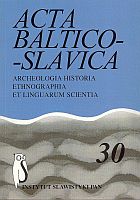Ekspresywizmy dodatnie utrwalone w pamiętnikach byłych mieszkańców Kresów północno-wschodnich
Positive Expressivisms Recorded in the Diaries of Former Residents of Poland’s Northeastern Border Areas
Author(s): Katarzyna WęgorowskaSubject(s): Language and Literature Studies
Published by: Instytut Slawistyki Polskiej Akademii Nauk
Keywords: the Polish northeastern dialect; positive expressivisms; appellatives; anthroponims
Summary/Abstract: The article deals with some emotionally colored words and word combinations which existed in the idiolects of the residents of Poland’s northeastern border areas in a period of 1918-39. Positive emotionalisms, which are presented and analyzed herein, make up two groups: 1) the diminutive forms; 2) the hypocoristic words. The diminutive forms are typical for the appellatives referring to people - duszeczka, panoczek; the house – kąteczek, sionka; household outbuildings – odrynka, świronek; houseware – samowarczyk, kilimek; culinary products – chłodniczek, bulionczyk; and animals – kabanek. Hypocoristic words, however, distinguish persons who are determined by the appellatives, e.g.: babciuchna, papańka, and by anthroponims, e.g. Adamko; Edek, Edzia, Edzieńka, Edka; Werunia, Nineczka. . In addition, the author has analyzed how specific northeastern positive expressivisms are formed. Thanks to carefully selected citations, she also emphasized the role of the context and the con-situation which supported the use of the positive expressivisms.
Journal: Acta Baltico Slavica
- Issue Year: 2006
- Issue No: 30
- Page Range: 471-493
- Page Count: 23
- Language: Polish

